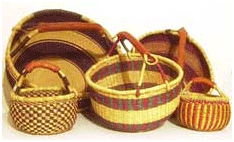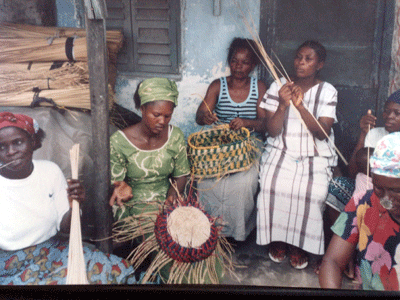The Bolga Basket:
 TEA (spoken Te – A ) basket with handle is produced in Bolgatanga.
TEA (spoken Te – A ) basket with handle is produced in Bolgatanga.
Two types of weaving are done (and most weavers only know one of them): It is double weaving (two uprights and thin straw) and single weaving (one upright and thicker straw). If the basket has reached its size a mouth has to be done. Here uprights are combined and bundled round. The handle is woven inside that mouth, is combined in the middle and bundled round with straw. The end of the straws on the baskets are cut with a blade. The TEA is ready.
Now there is till the leatherwork to be one on the basket: The handle is sawn around with goatleather, which increases the comfort of carrying a basket and also increases its stability and durability.
The Bolga Basket Weaver:
 In north-east of Ghana, near to the border to Burkina Faso, Bolgatanga is situated, where the Frafra are the original settlers. (Scientifically spoken the Frafra are a larger ethical group, and the weavers belong to the smaller tribe of the Gurunsi. In Ghana however the weavers call themselves Frafras.) In this area about 120.000 people are living and not in every house or compound families or villages weaving is a predominant vocation.
In north-east of Ghana, near to the border to Burkina Faso, Bolgatanga is situated, where the Frafra are the original settlers. (Scientifically spoken the Frafra are a larger ethical group, and the weavers belong to the smaller tribe of the Gurunsi. In Ghana however the weavers call themselves Frafras.) In this area about 120.000 people are living and not in every house or compound families or villages weaving is a predominant vocation.
Whilst agriculture – despite the poor soils of the Sahel zone – is the major occupation (millet, guinea corn, maize, groundnuts, beans, cattle and animal rearing) about 4000 people do weaving as a part time or even full-time occupation.
Most of them however see weaving as a side or additional occupation, as agriculture for self-sufficiency is their major profession. During the main farming season, weaving is neglected a little to give enough time for the harvest.
Out of the 4000 weaver we from Fairtrade Producer Society (FPS) co-operate and work together with 980 (survey and group registration 2002). They are from three villages: Gambigo, Nyarga and Sumbrungu.
In the individual compounds the weaver groups are organised like a family is together. To the outside, meaning towards the market and also our man Abu Sadik or Accraboy they are represented by their leaders. The Leaders – different for men and women – are the link to the market and are selected from the groups (families, between 5 and 30 people) themselves. Theirs is a service function: negotiate price, collect straw, collect money, transport baskets and straw, serve as communication link, such as orders, quantities, colours, style. In case of discrepancies the leader is sacked.



